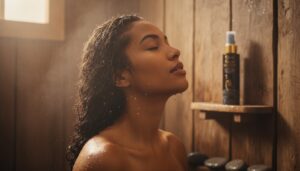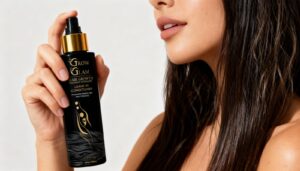For years, sulfate-free shampoos have been hailed as the ultimate solution for healthy, chemical-free hair. You’ve probably seen the labels screaming “No Sulfates!” or “100% Natural,” and felt confident that you’re doing your hair a favor. But what if we told you that not all sulfate-free shampoos are as safe or beneficial as you think?
Before you toss your regular shampoo, it’s time to uncover the truth. Here are 10 shocking facts about sulfate-free shampoos that no one tells you — plus expert tips to protect your scalp and hair health. If you’re serious about clean beauty that actually works, explore GrowGlam’s natural hair-care collection designed for real results.
1. “Sulfate-Free” Doesn’t Always Mean Chemical-Free
One of the biggest misconceptions about sulfate-free shampoos is that they’re completely natural. In reality, many brands replace sulfates with other synthetic detergents that are equally harsh on your scalp. Ingredients like cocamidopropyl betaine or sodium lauroyl sarcosinate might sound safer, but they can still cause dryness or irritation in sensitive users.
2. They Don’t Clean as Deeply as You Think
Sulfates are strong cleansing agents that remove oil and dirt effectively. Without them, your shampoo might not fully clear away product buildup, pollution, or sebum. Over time, this can lead to dull, heavy, or greasy hair — especially if you use styling products or live in humid environments. To maintain a healthy balance, pair your routine with a clarifying wash once a week.
3. Not All Hair Types Benefit from Sulfate-Free Formulas
While curly, color-treated, or dry hair types generally benefit from sulfate-free options, others may not. If your scalp produces excess oil, sulfate-free shampoos can sometimes make it worse, leading to buildup and dandruff. Knowing your hair type is key before jumping on the “clean beauty” trend.
4. Some Sulfate-Free Shampoos Contain Hidden Irritants
Just because it’s labeled “gentle” doesn’t mean it is. Many sulfate-free shampoos use alternative foaming agents and fragrances that can still cause allergies or itchiness. Always check for hidden ingredients like methylisothiazolinone (a common preservative linked to allergic reactions).
5. Your Hair May Feel Greasier at First
When switching from traditional shampoos, it’s normal for your scalp to take time to adjust. You may experience greasy roots or limp texture for the first few washes. That’s because sulfate-free shampoos don’t strip your scalp’s natural oils as aggressively — which is good, but requires patience.
6. Foam Isn’t Everything — But It Still Matters
Many people believe a foamy lather equals better cleaning, but that’s not always true. Sulfate-free shampoos produce less foam, which can feel unsatisfying — and lead users to use more product than needed. The result? Wasted product and sometimes residue buildup. Focus on scalp massage rather than bubbles for effective cleaning.
7. Some Brands Use “Greenwashing” Marketing Tricks
Here’s a harsh truth: not all sulfate-free shampoos live up to their “natural” label. Many companies use buzzwords like “botanical” or “organic-inspired” while still including synthetic fragrances and silicones. Always read ingredient labels — real clean beauty doesn’t hide behind marketing fluff. Transparent brands like Grow Glam list every ingredient with integrity.
8. Sulfate-Free Doesn’t Automatically Mean Color-Safe
Color-treated hair is often advised to avoid sulfates, but not all sulfate-free shampoos are truly color-safe. Some contain acidic agents or alcohol-based ingredients that can still fade hair dye. To protect your investment, choose products specifically labeled “color-safe” and enriched with hydrating oils and proteins.
9. They Can’t Replace Proper Hair Nutrition
No shampoo — sulfate-free or not — can repair damaged hair alone. Healthy hair begins from the roots, supported by proper scalp care, nutrition, and protective styling. Using nourishing products like GrowGlam Hair Growth Oil or Volumizing Hair Growth Conditioner helps strengthen and hydrate hair from within.
10. Some Sulfate-Free Formulas Are Actually More Expensive — and Less Effective
The irony? Many sulfate-free shampoos come with luxury price tags but deliver mediocre results. You might be paying more for marketing than for performance. Look for formulas with proven natural actives like biotin, argan oil, or caffeine — not just buzzwords.
So, Are Sulfate-Free Shampoos Worth It?
The answer depends on your hair type, scalp condition, and lifestyle. If you have dry, frizzy, or color-treated hair, sulfate-free shampoos can be beneficial — but they’re not a cure-all. The key is balance: using the right shampoo for your hair’s needs and maintaining a consistent care routine.
How to Choose a Truly Safe Sulfate-Free Shampoo
- ✅ Look for transparent ingredient lists — avoid hidden chemicals.
- ✅ Choose products that balance cleansing and hydration.
- ✅ Avoid overly fragranced formulas that can irritate the scalp.
- ✅ Pair sulfate-free shampoos with a restorative conditioner or oil.
- ✅ Trust certified brands like Grow Glam that focus on results and safety.
FAQs About Sulfate-Free Shampoos
1. Are sulfate-free shampoos really better for your hair?
They can be, especially for dry, curly, or colored hair. However, not all formulas are equal. Always check for other harsh ingredients.
2. Why does my hair feel oily after switching to sulfate-free shampoo?
Your scalp is rebalancing its oil production. It may take a few weeks for your hair to adapt to gentler cleansing.
3. Do sulfate-free shampoos cause buildup?
They can if not formulated well. Use a clarifying wash occasionally to prevent residue buildup.
4. What’s the best sulfate-free shampoo for daily use?
Try GrowGlam Hair Growth Volumizing Shampoo — it’s gentle, nourishing, and sulfate-free without hidden irritants.
Final Thoughts
“Sulfate-free” doesn’t automatically mean safer or healthier — it’s about the overall formulation. The best shampoo for you depends on your hair’s needs, scalp sensitivity, and lifestyle. Be an informed buyer: read labels, understand ingredients, and choose brands that prioritize your hair’s health over marketing trends.




